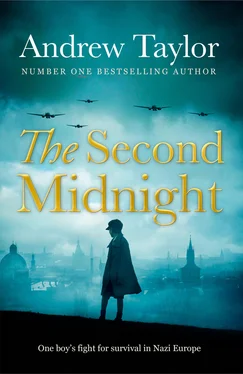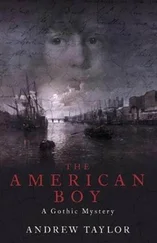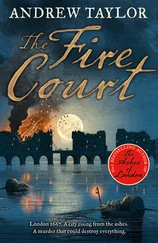Wilmot House was in a small street near Maid of Honour Row. Prim black railings and a narrow strip of flowerbed separated the pavement from the redbrick Georgian façade. A brass knocker shaped like a mermaid twinkled incongruously on the chaste, olive-green front door.
Hugh always enjoyed the change of atmosphere when he stepped into the house. Outside, everything was bright and regular; but the interior was dark and full of secrets. The hall was nearly a foot below ground level outside. It was stone-flagged and panelled in dark oak. The glass in the fanlight was green with age, which gave the hall the appearance of being under water.
Mrs Bunnings, the housekeeper, answered Alfred Kendall’s knock. She gave a nod and held the door open as the family trooped into the hall.
Mrs Kendall said, with an apologetic twitter, ‘And how is Mrs Lane today?’
‘As well as can be expected, madam,’ Mrs Bunnings said grimly. ‘The mistress is in the drawing room.’
She disposed of the Kendalls’ hats and coats and announced them ceremoniously. In the unimaginably far-off days of her youth, Mrs Bunnings had been a parlour maid in the household of a baronet; an Edwardian stateliness still distinguished her public manner.
Aunt Vida awoke with a start as they filed into the drawing room. As usual, she was wearing a shapeless grey dress beneath a thick grey cardigan. Around her neck were three gold lockets, each with its own chain. Each contained a photograph and a lock of hair: one was a shrine to the late Mr Lane, the others to their sons, George and Harry, both of whom had been killed at Passchendaele.
Alfred Kendall shook her hand and mumbled a vague enquiry about her health into his moustache. She didn’t bother to reply. The rest of the family kissed her cheek; it smelled of lavender water and felt like tissue paper.
‘Run along to the kitchen,’ Aunt Vida said to Hugh and Meg. ‘Give them a glass of milk, Bunnings, and then you can bring in the sherry.’
Meg and Hugh followed Mrs Bunnings out of the room. Until last year, Stephen would have gone with them. But when he left school, Mrs Bunnings started to call him Mr Stephen rather than Master Stephen; she made it quite plain that he was now too grown-up to have the freedom of her kitchen.
In her own domain, Mrs Bunnings became a different person. She told jokes; she gossiped; she pried indefatigably into their lives. She also gave the children scones, which was contrary to Mr Kendall’s strict instructions that their appetites should not be spoiled.
She left them for a moment to take the sherry and biscuits into the parlour. When she got back, she tapped Hugh on the shoulder.
‘What’s all this, young man? I heard your dad saying you’d been expelled from that school of yours.’
Hugh flushed. ‘I have. Someone stole some money and they thought it was me. But it wasn’t – I promise.’
Meg dabbed at the rim of milk around her lips with a handkerchief. ‘Father gave him eight of the best,’ she said ghoulishly. ‘He had nothing to eat on Friday night and he was only allowed bread and water yesterday.’
Mrs Bunnings snorted. ‘I know who I’d beat if I had half a chance. Have another scone, you poor lamb.’
When alone with the children, the housekeeper never made any secret of her dislike of their father. Miss Muriel, Mrs Lane’s niece, had been as happy as the day was long before she married him: and look at her now. Their father only bothered with these weekly visits because he wanted to get his hands on Mrs Lane’s money. Mrs Bunnings didn’t know why he troubled to come since, when he got here, he just sat there and grunted.
‘What will he do with you now? Has he found you another school?’
‘I don’t know.’ Hugh avoided Mrs Bunnings’s eyes. His fingers traced the reassuring shape of Hiawatha in his trouser pocket.
‘Father says that if Hugh was a few years older he’d pack him off to Australia and have done with him.’ Under the table, Meg put her hand on Hugh’s knee; it made him shiver. ‘He really means it.’
Hugh shifted uneasily. Sitting down was still uncomfortable and he wished Meg would remove her hand. Mrs Bunnings might see. The long, low kitchen was like a hothouse; Mrs Bunnings had insisted on keeping the old-fashioned range. The heat, the food and even the sympathy combined to make him feel drowsy.
A bell jangled over the door. It was precisely twenty minutes after they had entered the house. Mr Kendall always timed their visits with meticulous care. At the end of the twenty minutes, he would stand up and announce they had to be going, usually when his wife was in mid-sentence.
Mrs Bunnings escorted the children back to the drawing room to say goodbye. Mr Kendall was waiting impatiently by the door. Hugh had often wondered why his father seemed always to be in a hurry to be somewhere else; when he reached the somewhere else, he was always in a hurry to leave there as well.
For once, Aunt Vida seemed reluctant to let them go. She made Mr Kendall make up the fire for her. She suddenly remembered that she wanted her niece to get her some wool; the commission involved a great deal of explanation, during which Mr Kendall jabbed angrily at the fire with the poker. He consulted his watch.
‘We shall miss the train if we don’t hurry.’
‘Off you go then.’ Aunt Vida paused. ‘Hugh, come over here. I want a word with you.’
Alfred Kendall turned in the doorway.
‘Hugh can run after you,’ Aunt Vida said firmly, before he could protest. ‘Please close the door behind you.’
Kendall gnawed his lower lip but said nothing. He shut the door behind him; with a little more force, it would have been a slam.
Aunt Vida beckoned Hugh towards her. ‘I hear you’ve been in hot water again.’
Hugh nodded. There was nothing he could say.
‘Bring me my handbag. It’s on the bureau.’
Like his father, Aunt Vida was always giving orders; Hugh found it odd that he wasn’t afraid of her. His parents and Meg were afraid of her – even Stephen was wary of what he said and did in her company. He fetched her the battered black bag and stood patiently while she rummaged in it. He watched her face with fascination: her skin was a maze of wrinkles; there were more cracks than surface.
Suddenly she glanced up at him. ‘Don’t you know it’s rude to stare at a lady? Hey?’
Hugh grinned. He heard the front door closing with a bang; Mrs Bunnings was glad to see the back of her visitors.
Aunt Vida nodded in the direction of the sound. ‘Don’t let it get on top of you,’ she said gruffly. ‘These things pass. Worse things happen at sea, not that that’s much consolation. When your father asks why I kept you, say I was telling you to be a better boy in future. Here, hold out your hand.’
Hugh looked down. On his palm was a half-crown.
‘Kendall?’ Colonel Dansey stared with distaste at his plate; it was difficult to tell whether it was the omelette or the name of Kendall that was responsible for the irritation in his voice. ‘Who the devil’s he?’
‘He’s a glass importer, sir.’ Michael Stanhope-Smith sipped his burgundy appreciatively. Early in their acquaintance, he had learned that it was a mistake to deluge Uncle Claude with information; Dansey himself never made that mistake and he expected those who worked for him to be equally sparing.
Michael glanced over his shoulder to make sure that no one was in earshot of their table. The dining room at the Savoy was still moderately crowded, but it had definitely passed the Sunday lunchtime peak.
Dansey arranged his knife and fork neatly on his empty plate. He adjusted the dark-rimmed pebble glasses on his large, curved nose. ‘You know that I don’t encourage people to indulge in recruiting off their own bat. Recruit in haste and repent at leisure.’
Читать дальше












